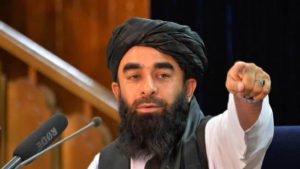![]()
Taliban leader Sher Mohammed Abbas Stanekzai has said the group wants to continue Afghanistan’s political, economic and cultural ties with India, the first time a member of the Taliban’s top hierarchy has spoken on the issue since the takeover of Kabul.
In a nearly 46-minute video posted on the Taliban’s social media platforms on Saturday, Stanekzai spoke extensively in Pashto on the end of the war in Afghanistan and the Taliban’s plans for forming an Islamic administration based on Shariah. He also spoke about the Taliban’s views on relations with key countries in the region, including India, Pakistan, China and Russia.
Since the Taliban assumed power in Kabul after the collapse of the Ashraf Ghani government on August 15, the group’s spokesmen Suhail Shaheen and Zabiullah Mujahid have spoken to the Pakistani media about the group’s views on relations with India. However, Stanekzai is the first senior leader to make a statement on relations with other countries.
“India is very important for this subcontinent. We want to continue our cultural, economic and trade ties with India like in the past,” Stanekzai said.
“Trade with India through Pakistan is very important for us. With India, trade through air corridors will also remain open,” he said, outlining the Taliban’s plans for trade in the region.
However, he didn’t say whether trade via India should be two-way. Pakistan has allowed Afghan traders to ship their goods to India through its territory but has never permitted Indian goods to be transported via Pakistani soil to Afghanistan.
“We give due importance to our political, economic and trade ties with India and we want these ties to continue. We are looking forward to working with India in this regard,” Stanekzai added.
While speaking about Afghanistan’s relations with Turkmenistan, Stanekzai mentioned the Turkmenistan-Afghanistan-Pakistan-India (TAPI) gas pipeline project and said the Taliban would work to address the problems holding up the venture once a government is formed.
tanekzai also referred to the Chabahar port developed by India while speaking about relations with Iran and highlighted its importance for trade.
He also spoke about relations with China, Tajikistan, Uzbekistan, Pakistan and Russia. He thanked Pakistan for hosting millions of Afghan refugees and said Afghanistan wants to have brotherly relations with Pakistan.
As reported by Hindustan Times, Stanekzai had informally reached out to the Indian side after the Taliban took over Afghanistan and made a surprise request for New Delhi to retain its diplomatic presence in Kabul. He had also referred to reports that fighters from Pakistan-based Lashkar-e-Taiba (LeT) and Lashkar-e-Jhangvi (LeJ) were in Kabul and deployed at check posts on routes to the airport, and contended that all check posts, including those at the airport, were firmly in the hands of the Taliban.
However, the Indian side concluded Stanekzai’s message couldn’t be taken at face value and went ahead with plans to pull out nearly 200 diplomats, officials and security personnel, including the ambassador, from Kabul. There was no response from Indian officials to Stanekzai’s remarks.
Stanekzai, who is seen as the number two in the Taliban’s negotiating team and third overall among leaders based in Qatar, trained for several years at the Indian Military Academy (IMA) in Dehradun in the early 1980s. People familiar with developments said on condition of anonymity that he appeared to be taking on a key role in foreign relations though he has not been part of the decision-making in Kabul.






